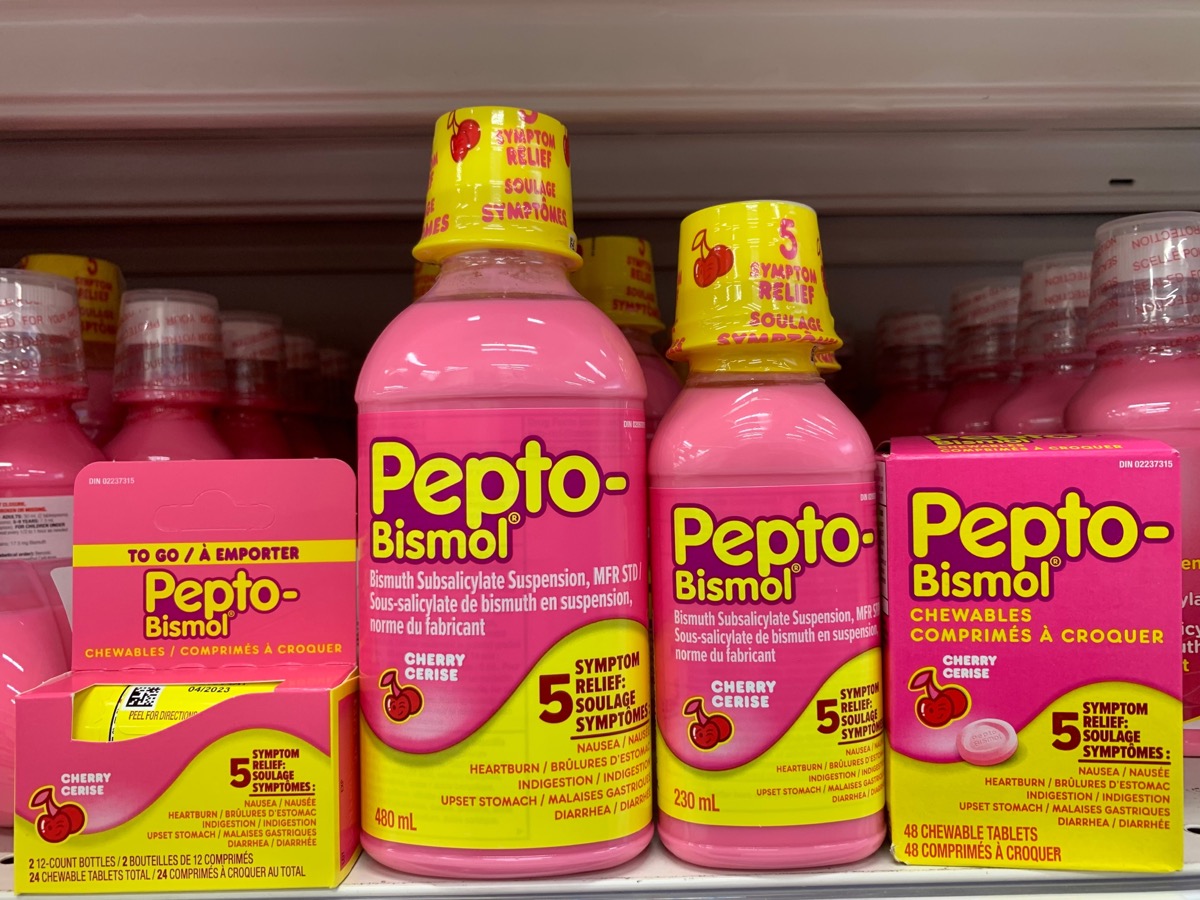The next time you’re suffering from heartburn or an upset stomach, you might want to take a second look at the antacids you have in your medicine cabinet. Doctors say there might be a sneaky ingredient in your over-the-counter (OTC) Pepto-Bismol that can be dangerous, even leading to stomach bleeding.
RELATED: Doctors Warn These OTC Antacids Can Put Your Heart in Danger.
The FDA warns about antacids that contain aspirin.
A few years ago, the U.S. Food and Drug Administration (FDA) released a consumer update concerning the use of particular OTC antacids. The agency has long warned that aspirin can increase someone’s risk of bleeding, and now it’s extending the concern to antacids that have aspirin as an ingredient.
“Aspirin-containing medicines to treat heartburn, sour stomach, acid indigestion or upset stomach can cause stomach or intestinal bleeding,” the FDA said in its new warning.
Though these cases remain rare, the FDA indicated that there were new instances of serious bleeding from these medications: “Some of those patients required a blood transfusion.”
Therefore, the FDA suggests “stomach medicines that don’t contain aspirin.”
Pepto-Bismol could be especially concerning.
Kelly Johnson-Arbor, MD, a medical toxicologist and the co-medical director of the National Capital Poison Center, tells Best Life that one of the most popular OTC antacids has aspirin in it, or at least something very similar.
“Pepto-Bismol contains a form of aspirin,” she says. “Aspirin is a type of salicylate drug, and the bismuth incorporated in Pepto-Bismol is formulated with a salicylate in a compound called bismuth subsalicylate. Both liquid and chewable forms of Pepto Bismol contain bismuth subsalicylate.”
“Other antacid and antidiarrheal products, including generic or store-brand analogs of Pepto-Bismol, Kaopectate, and ‘stomach relief’ medications, may also contain bismuth subsalicylate,” she adds.
To determine if your antacid contains this ingredient, Karen Murry, MD, deputy director of the Office of Nonprescription Drugs at the FDA, recommends looking at the Drug Facts label on the medication packaging. Those that contain aspirin will have it included on the label, as well as have the risk factors for bleeding listed.
RELATED: Doctors Warn This Common Medication May Be Linked to Dementia Risk.
Yet, other medical experts say Pepto-Bismol is the best antacid choice.
Despite the risk for some people, Pepto-Bismol may still be the best antacid choice for others.
Tessa Spencer, PharmD, a specialist in community pharmacy and functional medicine, tells Best Life that the antacid she considers “best overall” is Pepto Bismol Original Liquid, which is used to treat not only heartburn but also diarrhea, nausea, and upset stomach.
She adds that going with the medication’s generic version, called bismuth subsalicylate, may help you save money while providing the same benefits.
“Bismuth subsalicylate coats the stomach and soothes heartburn” in those with “mild, intermittent heartburn,” she says. However, she notes that this product can sometimes cause constipation, so you’ll have to take that into consideration.
Spencer points out that sometimes customers prefer to take chewable antacids, and in this case, she recommends Rolaids Extra Strength Antacid Chewable Tablets, which incorporate two ingredients—magnesium and calcium carbonate.
“There are many different acid reflux medications that contain magnesium. Combined with calcium carbonate, this combination neutralizes stomach acid both in the stomach and the esophagus. The combination of these two active ingredients can alleviate nausea and discomfort,” she explains.
RELATED: Doctors Warn This Popular Med Is “The Most Dangerous OTC Drug.”
What to know before taking any antacid:
According to the FDA, the risk of experiencing serious bleeding from aspirin-containing antacid products is higher for certain people.
Factors that can increase your risk include being 60 or older, having a history of stomach ulcers or bleeding problems, drinking three or more alcoholic drinks every day, as well as taking blood-thinning drugs, steroid medicines to reduce inflammation, or other medicines containing non-steroidal anti-inflammatory drugs (NSAIDs) like aspirin.
“Warning signs of stomach or intestinal bleeding include feeling faint, vomiting blood, passing black or bloody stools, or having abdominal pain,” the FDA notes. “Those are signs that you should consult a health care professional right away.”
And while Spencer says antacids are safe for most people to take, she notes that before doing so, “it’s important to speak to a pharmacist or your healthcare provider first if you are pregnant or breastfeeding, have liver disease, kidney disease or heart failure, have an illness that means you need to control how much salt (sodium) is in your diet, such as high blood pressure or cirrhosis, or are taking other medicines.”
In addition to taking an antacid, she also advises making certain lifestyle changes that may help improve your symptoms. These may include eating smaller meals, cutting back on foods and drinks that can cause heartburn, avoiding lying down within three hours of meals, elevating the head of your bed by six to eight inches, and asking your pharmacist if other medications you take could be aggravating your heartburn.
This story has been updated to include additional entries, fact-checking, and copy-editing.
We offer the most up-to-date information from top experts, new research, and health agencies, but our content is not meant to be a substitute for professional guidance. When it comes to the medication you’re taking or any other health questions you have, always consult your healthcare provider directly.
